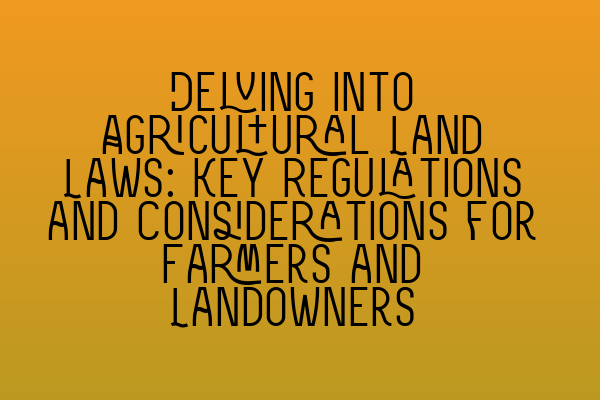Delving into Agricultural Land Laws: Key Regulations and Considerations for Farmers and Landowners
Agricultural land plays a crucial role in the livelihood of farmers and landowners. However, navigating the complex legal landscape surrounding agricultural land can be challenging. Understanding the key regulations and considerations is essential for ensuring compliance and protecting one’s rights as a farmer or landowner. In this article, we will delve into the important aspects of agricultural land laws to provide you with a comprehensive insight into this subject.
1. Agricultural Holdings Act 1986
The Agricultural Holdings Act 1986 is a key piece of legislation that governs agricultural tenancies in England and Wales. It provides security of tenure for agricultural tenants, outlining the rights and obligations of both tenants and landlords. Under this Act, tenants have the right to remain in occupation unless specific grounds for termination are established.
It is crucial for farmers and landowners to understand the provisions of this Act, as it impacts various aspects of agricultural tenancies, including rent reviews, repairs, and succession rights. Seeking legal advice from a solicitor who specializes in agricultural land law can ensure compliance with the Agricultural Holdings Act 1986.
2. The Basic Payment Scheme (BPS)
The Basic Payment Scheme (BPS) is an agricultural subsidy scheme provided by the European Union. It supports farmers and landowners by providing direct payments based on eligible land area and specific agricultural activities. However, with the UK’s exit from the EU, the future of the BPS is uncertain.
Farmers and landowners should stay updated on the latest developments regarding the BPS, as it directly impacts their income and financial planning. The Department for Environment, Food and Rural Affairs (DEFRA) provides guidance on the BPS, and professional advisers can assist in understanding the eligibility criteria and application process.
3. Planning Permission and Development Restrictions
When considering development on agricultural land, obtaining planning permission is a crucial requirement. Local planning authorities have the power to grant or deny permission based on various factors, including the impact on the environment and surrounding community.
Understanding the planning permission process and the restrictions that apply to agricultural land developments is vital for farmers and landowners. It is advisable to engage an experienced solicitor who specializes in property law to assist in navigating the planning application and ensure compliance with relevant regulations.
4. Environmental Regulations
Agricultural land is subject to various environmental regulations aimed at protecting wildlife habitats, water resources, and ecosystems. Compliance with these regulations is essential to avoid potential penalties and to uphold environmental sustainability. Some of the key environmental regulations applicable to agricultural land include:
- The Water Resources Act 1991
- The Wildlife and Countryside Act 1981
- The Environmental Impact Assessment Regulations 2017
- The Nitrate Pollution Prevention Regulations 2015
Engaging with environmental consultants and legal professionals can help farmers and landowners understand their obligations and develop sustainable practices that adhere to these regulations.
5. Succession Planning
Succession planning is a crucial consideration for agricultural landowners to ensure the smooth transfer of assets and business continuity to the next generation. It involves careful estate planning, which may include creating wills, trusts, and partnership agreements.
Consulting with solicitors who specialize in succession planning and agricultural land law can help farmers and landowners navigate the complexities of transferring agricultural assets and minimize potential inheritance tax liabilities.
Conclusion
Understanding the intricacies of agricultural land laws is essential for farmers and landowners to protect their interests and ensure compliance with relevant regulations. By familiarizing themselves with the Agricultural Holdings Act 1986, the Basic Payment Scheme, planning permissions, environmental regulations, and succession planning, farmers and landowners can navigate the legal complexities of agricultural land with confidence.
If you need further assistance in understanding agricultural land laws or require legal advice specific to your situation, SQE Property Law & Land Law is here to help. Our team of expert solicitors can provide the guidance and support you need to navigate the legal complexities and protect your rights as a farmer or landowner.
Related Articles:
